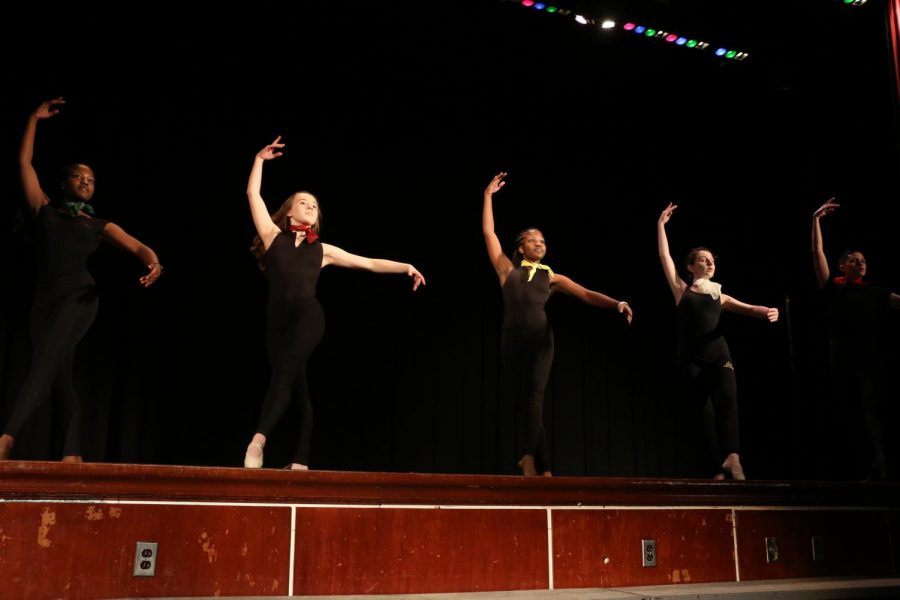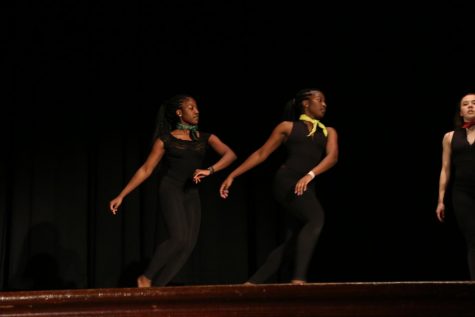MLK Lives on in DMAE
On April 9, 2018, the DMAE student body witnessed a commemoration for a civil rights leader who stamped his mark on history. The MLK@50 Remembrance assembly reminded the DMAE community of what Dr. Martin Luther King stood and died for. The performers showed that his advocacy still lives on 50 years after his death, which is what history teacher L. Adrian Bickham had intended.
“Fifty years has spanned since the MLK death and I felt we should see whether the issues that he advocated for have improved over time. The issues he felt were important, civil rights and world peace, are what he lived and sacrificed for,” Ms. Bickham said.
Ms. Bickham saw the need for an assembly commemorating Dr. King and began to organize it with the help from students in the Social Studies Honor Society and the Girls of Culture club. They hoped to highlight and inform the DMAE community with Dr. King’s viewpoints.
“MLK stood for human dignity and we should continue his legacy,” Ms. Bickham said.
Ms. Bickham and her students planned and created videos and performances that exhibited Dr. King’s advocacy. Other students also came to her asking to perform for this assembly, and Ms. Bickham felt it only added more to the message.
The assembly was held period 6 for freshman and sophomores, and period 7 for upperclassmen. Social Studies Honors Society co-presidents Merin Jacob and Timothy Stephens gave a short commemorative reflection on Dr. King. This was followed by a sequence of music and dance performances. Genesis Capellan sang “Rise Up” accompanied by Patricia Parker on the piano, then followed a group of students who sang “Glory,” and another group of students who worked on “Black Sand,” an interpretive dance number that combined modern and ballet genres.
The dance included several parts with choreography by both sophomore Adam Morales and senior Nicky Consales. It was set to the song “Black Sand” by Bonobo, and included Adam, Nicky, and juniors, Korka and Jarry Fall, and Teresa Lebowitz. The students believed the lyrical dance represented racial harmony.
“The dance showed our unison as a school,” Nicky said. “I remember walking on stage and hearing the audience yell my name and the names of the other performers. It was great to see such a positive reaction to a special dance that we poured our hearts into.”
Students in both assemblies responded enthusiastically to the performers.
“There is an expression don’t tell, show. We had performance that spoke the message of love and acceptance and judging on what they do instead of assuming what someone is. This message, I think, was very nicely grasped by the audience,” Ms. Bickham said.
Not everything went smoothly, however, prior to the presentation of the assembly, but students were able to overcome the obstacles.
“The event as a whole was successful, but there were a few problems with rehearsals,” Nicoletta explained. “None of the performers ran their pieces with everyone present until the day of the show, so it was a little scary for those who had never performed on a stage in front of a huge crowd.”
The MLK@50 Remembrance assembly was held to emphasize that Dr. King’s impact is especially important for DMAE. Ms. Bickham will retire this year, and she wanted to make sure that she planted the seed for MLK remembrance in DMAE’s future. By showing the campus Dr. King’s advocacy and his message, she conveyed the importance of advocacy as a necessity.
“As a fond farewell, I do want to make sure MLK is remembered, and I want this campus to continue to be great and become even greater in the future,” Ms. Bickham concluded.

Julia Schwartz, a senior in the Biomedicine Academy, is a third-year writer and co-editor for The Maroon Tribune. She loves to write political and social...




